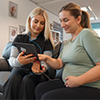Swelling, or edema, is a common pregnancy symptom, especially in the later stages. It usually occurs in the feet, ankles, legs, and hands as your body retains extra fluid to support you and your growing baby. While some swelling is normal, it can be uncomfortable. Here are some safe, effective ways to reduce pregnancy swelling, plus tips on when to seek medical advice.
Why Does Swelling Happen During Pregnancy?
As your pregnancy progresses, your body increases blood and fluid production to meet the needs of both you and your baby. Hormones, the weight of the growing uterus, and changes in circulation also contribute to fluid retention. While this is a normal part of pregnancy, understanding ways to manage it can help keep you comfortable.
1. Stay Hydrated
It may sound counterintuitive, but drinking plenty of water can actually help reduce swelling. When you’re hydrated, your body retains less excess fluid. Aim to drink 8–10 cups of water daily to flush out toxins and support circulation. If you struggle with plain water, try adding lemon slices, mint, or cucumber for a bit of flavour.
2. Elevate Your Feet and Avoid Prolonged Standing
Elevating your feet helps reduce the buildup of fluid in your lower extremities. Try to rest with your feet propped up for short periods throughout the day, especially if you’re on your feet a lot. Avoid sitting or standing for extended periods, as this can cause fluid to pool in your legs and feet.
3. Wear Comfortable Shoes and Supportive Clothing
Tight shoes or restrictive clothing can worsen swelling. Look for shoes with good arch support and avoid tight socks or stockings. Many pregnant women find that compression stockings, which apply gentle pressure to your legs, can help prevent fluid buildup and reduce discomfort.
For more guidance, check the NHS advice on footwear and support during pregnancy.
4. Incorporate Gentle Exercise
Light physical activity, like walking, prenatal yoga, or swimming, can stimulate circulation and reduce swelling. Exercise also helps move extra fluid out of tissues. Swimming is especially helpful, as water pressure on your legs and feet can temporarily relieve swelling and provide a sense of weightlessness.
For more on safe exercises, check the NHS guide on exercise during pregnancy.
5. Eat a Balanced Diet and Watch Salt Intake
Eating a nutritious diet can help your body maintain the right balance of fluids. While you don’t need to eliminate salt entirely, reducing your intake can help prevent excess fluid retention. Focus on fresh fruits, vegetables, whole grains, and lean proteins.
Foods rich in potassium, like bananas, sweet potatoes, and avocados, can also help balance your body’s sodium levels.
6. Avoid Tight Rings and Jewelry
As your hands may swell, avoid wearing tight rings and jewelry that can restrict blood flow. Consider removing them, especially in the third trimester, to prevent discomfort and circulation issues.
7. Sleep on Your Left Side
Sleeping on your left side helps improve circulation and reduces pressure on the veins that carry blood from your lower body to your heart, which can ease swelling. Using a pregnancy pillow can make this position more comfortable.
8. Limit Caffeine and Sugary Drinks
Caffeine and sugary drinks can contribute to dehydration, which may worsen swelling. Opt for water, herbal teas, or decaffeinated drinks to stay hydrated and keep your body balanced.
When to Seek Medical Advice
Some swelling is normal during pregnancy, but sudden or severe swelling, particularly in the face or hands, can be a sign of preeclampsia, a pregnancy complication that requires immediate medical attention. Contact your healthcare provider if you notice:
- Sudden swelling in your face or hands
- Extreme swelling in your legs or ankles
- Severe headache, vision changes, or pain below your ribs
- High blood pressure
For more information, see the NHS guidance on pregnancy swelling and when to seek help.
Taking Care of Yourself
While some swelling is just a part of pregnancy, these strategies can make you more comfortable and help manage the effects. Stay mindful of your body, and make rest, hydration, and gentle movement part of your daily routine. If you’re ever unsure about your symptoms or need personalised advice, don’t hesitate to reach out to your healthcare provider.
Remember, Window to the Womb is here to support you through every stage of pregnancy. Whether it’s guidance, reassurance, or a glimpse of your baby’s progress, we’re here to help make your pregnancy journey as smooth as possible.













 Packages & Prices
Packages & Prices  Important Info & Policies
Important Info & Policies  Your Scan
Your Scan